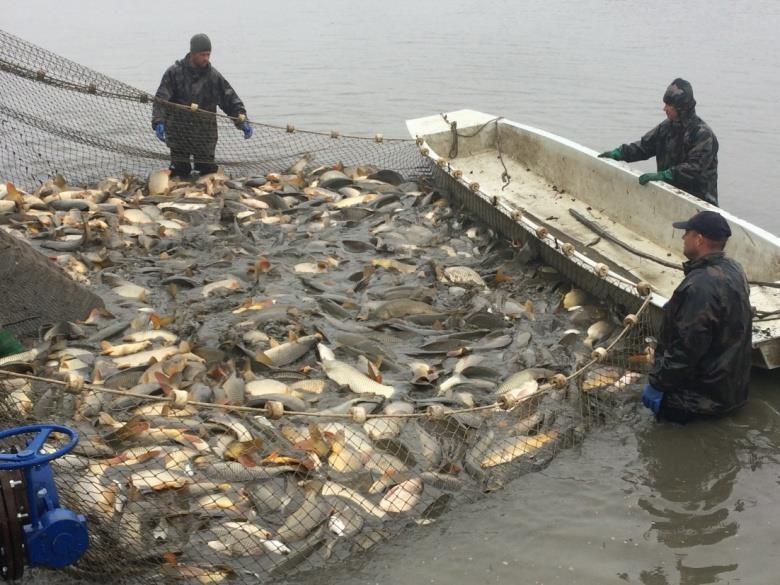
The large ponds next to the village of Biharugra, in the Southern Great Plains of Hungary, are a natural paradise. This amazing wetland ecosystem is rich of aquatic life and it is part of a Special Protection Area (SPA) under the Birds Directive within Natura 2000. Therefore a casual observer might not suspect that (s)he is also looking at one of the largest and most economically, ecologically, and historically significant fishponds in Hungary.
The fish farming company Biharugrai Halgazdaság, operates those ponds for the production of grass carp, bighead carp and catfish, and the pristine status of those waters is a precious asset. The Biharugra carps (certified by the National Agricultural Certification Institute) are sought after not only in Hungary but also in foreign markets due to their excellent appearance and eating qualities. As herbivorous fish, bighead carp and grass carp play an important role in maintaining the ecosystems of the Biharugra fishponds. The fish are reared under strict and continuous veterinary control, which, together with the company’s quality assurance system, guarantees high-quality and reliable fish products to customers at any time of the year. The fish are sold to retailers, traders and fishing associations both in Hungary and abroad, including Romania, Slovakia, Poland, the Czech Republic, and Italy.
To ensure the quality of the waters, Biharugrai Halgazdaság adheres to healthy and ecologically-friendly feeding practices and nature conservation strategies. The producers have created a closed ecosystem within the ponds that minimises environmental impact and waste. Plankton present in the ponds provide a natural source of protein for the fish, and the company uses only cereals for supplementary feed, so the fish consume only food of natural origin, free from GMOs, antibiotics and other drugs.
In 2017, thanks to support from the EU, the company undertook number of projects to develop the infrastructure of its fishponds, as well as constructing additional facilities to improve the livelihoods of its employees. Those included renovations to the inner lining of the fishponds to enable them to be drained, and strengthening of the dams between the ponds. Additional improvements included dredging, restoration of wintering and storage ponds; stabilisation of a dilapidated 300-metre section of roadway; and the addition of a recreation room, changing room, kitchen and toilet to improve working conditions for the employees.
The technical improvements to the fishponds have made it possible for Biharugrai Halgazdaság to carry out nutrient replenishment in a much more efficient way. The project has also made it possible to introduce new offspring-rearing practices, as well as an effective system to protect the site from predatory birds, in full respect of the bird protection legislation. The already excellent water quality has improved and likewise has the mineral richness of the bed of the fishponds, resulting in fish with uniquely clean-tasting meat.
Without EU support, it would not have been possible to fully implement the projects and hence to increase the competitiveness of the local economy at both domestic and international levels. With rising incomes likely to lead to higher seafood demand, and no possibility of offshore fishing, there has never been a more important time for Hungary to focus on intelligent and sustainable public investments in aquaculture. Moreover, maintaining fish farming on the ponds is important for the conservation goals of the region, and contributes to the health of the local habitat and the biodiversity of the surrounding ecosystem. The projects undertaken by Biharugrai Halgazdaság have shown that EU-funding enables landlocked countries to bolster their seafood markets, improve the environmental sustainability of their food production, and better the socio-economic conditions of their citizens, in line with the environmental and social sustainability objectives of the EU.
Did you like this story?
Then also check out the June edition of Euronews OCEAN Season 3 Episode 6 - restoring sea anemones for nature, medicine and gastronomy
Keep informed about the project
Website: www.bhgfish.com
Video: https://www.youtube.com/watch?v=d1H7xHoQp8s
Documents: Aquaculture guidelines
Details
- Publication date
- 25 June 2021
- Author
- Directorate-General for Maritime Affairs and Fisheries
